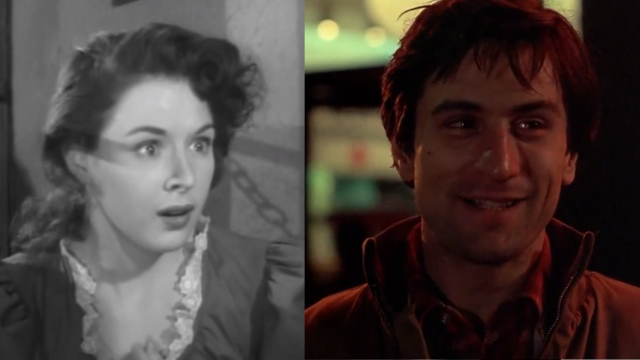“I got some bad ideas in my head.”
Taxi Driver and Outrage are two movies about individuals who are desperately searching for empathy without realising that’s what they want. Outrage is about a woman who is very easy to sympathise with – a young woman who has been raped. Indeed, her movie is filled with people who feel compassion and pity for her. Compassion, however, fails to heal the wound she’s suffered – indeed, it infuriates her to the point that she runs away to somewhere where nobody knows her and she’s not defined by her assault. Compassion has utility – it drives us to act to help others – but it is not an empathetic emotion and it alone can’t achieve what empathy can. If Outrage took place today, its heroine would be able to call herself a survivor, and through that find other survivors who understand her thoughts and emotions and reflect them back to her. Within her movie, Ann achieves the same effect with empathy the other way – she finds a priest who expresses a perspective she finds familiar, and that she can apply to her own situation. It gives her some internal structure and language that allows her to stabilise and heal.
Taxi Driver is, famously, about a man who is very difficult to sympathise with – even aside from the fact that he’s a racist who embraces violent tendencies by the end of the movie, his social anxiety, incompetence, and unhappiness is so crushing that it’s simply no fun to put yourself in his shoes. There’s little to no connection between his inner life and the world he has to live in. His experiences are a series of sensations that have no meaning or definition to them, and his writing and narration are a mess of feelings and observations that take no shape. His attempts to connect to other people are clumsy and ineffectual, revealing how little he actually understands the world around him; he knows when he asks a woman out, he’s supposed to take her to the movies, but he doesn’t understand he’s not supposed to take her to a porn theater. When he tries articulating his feelings to other people, his thoughts come out as a jumble, and rather than even try to empathise, they either ignore him or try to enforce their own perspective on him. Neither succeeds at stablising him; in fact, like a nuclear reactor undergoing meltdown, the emotional pressure only builds as he desperately looks for any kind of release, and like a nuclear reactor undergoing meltdown, that release is as simple as it is explosive.
If Taxi Driver were to take place today, Travis would find a community that would give him language for the things he felt – Chads and simps and kings and Staceys and such. This is not to put that community on the same level of morality as the survivor community, and in fact quite the opposite – I see one community that’s destructive and one that’s constructive, with the similarities being that both are widespread and both have a clear language. Terry Pratchett wrote about a world where human beings (and their approximates, like dwarves, golems, and Australians) are the connective tissue between incorruptible divinity and extremely corruptible reality; if that’s how things are, then perhaps language is the tool humans use to access the same divine space, and education is the main tool a community uses to bring many people to that one space, and a strong community is the way to avoid the explosion of an individual.


